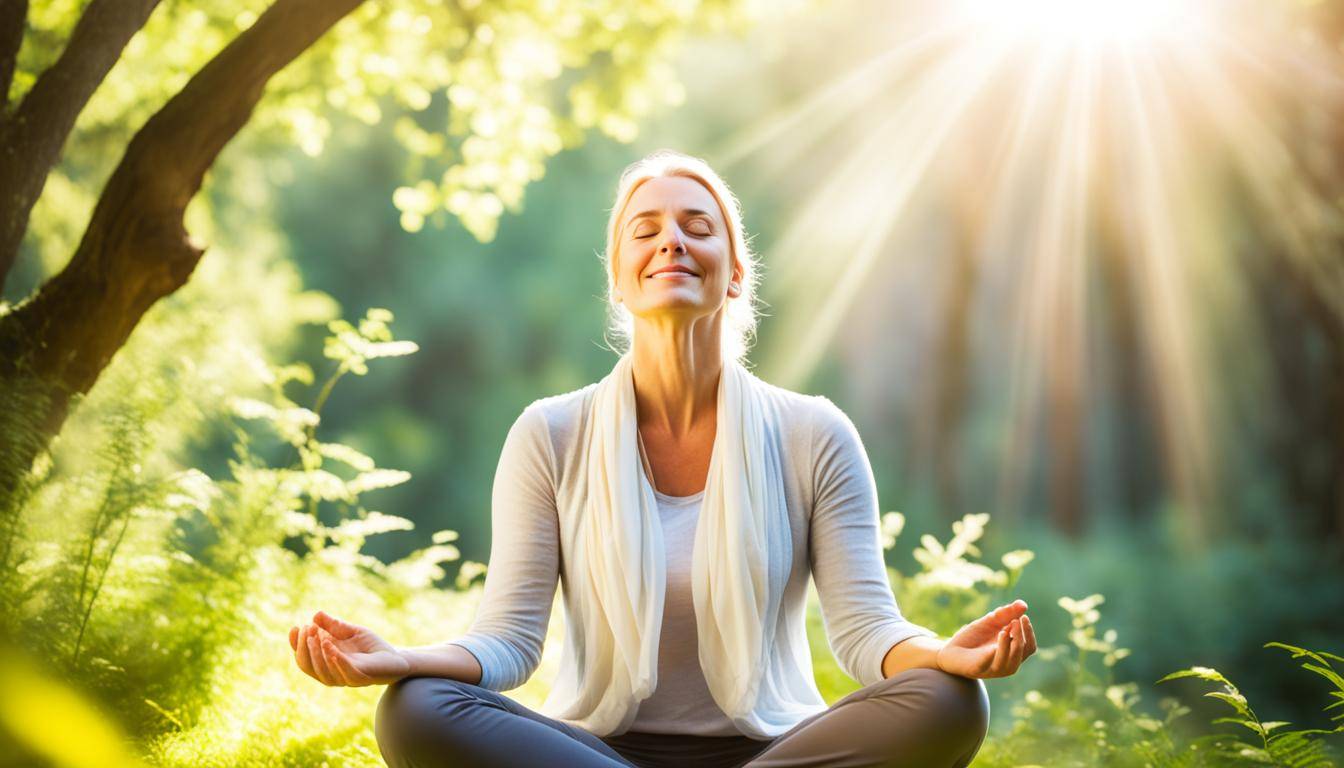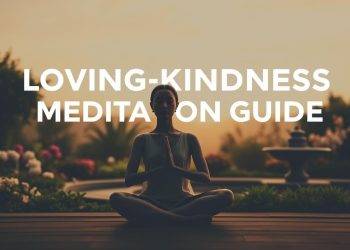“The mind is everything. What you think, you become.” – Buddha
Start a journey of self-discovery with guided meditation for beginners. In today’s fast-paced world, mindfulness meditation is a peaceful retreat for your mind, body, and spirit. It helps you find stress relief, improve focus, and grow inner peace.
Meditation is a strong tool to break free from automatic behavior. It helps you make better choices and actions, leading to a more balanced life. For beginners, guided meditations are great. They help you focus and let go of self-criticism during meditation.
Key Takeaways
- Guided meditation can help reduce stress and enhance focus
- Beginners can start with short 5-10 minute meditations
- Consistent practice is key to unlocking the full benefits of meditation
- Guided meditations offer a structured approach for beginners
- Meditation doesn’t require a perfect environment – just your commitment
Understanding Mindfulness and Meditation
Mindfulness means being fully present and engaged with what’s happening now, without judging it. By practicing mindfulness meditation, you can become more aware of yourself. This helps you handle stress and anxiety better.
Mindfulness meditation is a key tool for this. It helps your mind focus and notice thoughts, feelings, and body sensations without judgment.
The Essence of Meditation
Jon Kabat-Zinn created the Mindfulness-Based Stress Reduction (MBSR) program. Mindfulness meditation helps you stop judging and be curious about your thoughts. It teaches you to pause before reacting, breaking old habits.
This makes you kinder, calmer, and more patient. It can change many parts of your life for the better.
A big part of mindfulness practice is focusing on your breath. It keeps you in the now. There’s no right or wrong way to meditate. Just notice when your mind wanders and bring it back.
You can meditate alone or with others. There are programs like Mindfulness-Based Stress Reduction and Mindfulness-Based Cognitive Therapy.
| Meditation Benefits | Impact on Well-Being |
|---|---|
| Reduced stress levels | Emotional regulation and improved mental clarity |
| Improved sleep quality | Enhanced present moment awareness |
| Release of worries and anxiety | Increased focus and concentration |
To get the most from mindfulness meditation, make it a daily habit. Aim for 20 minutes a day. Meditate at any time, focusing on the now and your feelings without judgment.
“Mindfulness is the practice of being fully present and engaged with the current moment, without judgment.”
Choosing Your Meditation Technique
Starting your mindfulness journey means trying out different meditation techniques. It’s key to find one that fits your goals and lifestyle. You might like focused attention or loving-kindness methods. Try body scans, walking meditation, or mantras to see what helps you most with stress and well-being.
Guided meditation can help with physical, mental, and emotional issues. It’s great for beginners and helps keep your mind focused. Loving-Kindness Meditation boosts self-love and improves relationships, while Mindfulness Meditation helps you focus, lowers stress, and increases self-awareness.
- Mantra Meditation gives your mind structure and helps with stress and health. It also shows you what you truly want.
- Breathing meditation reduces stress right away, brings you back to the present, and makes your body and mind feel new.
Remember, there’s no single “best” meditation style. Each one has its own benefits and experiences. Try different types to see what feels right for you. Finding your favorite meditation can help you use stress reduction and personalized meditation to improve your life.

| Meditation Technique | Benefits |
|---|---|
| Guided Meditation | Aids in addressing physical, mental, and emotional challenges; provides guidance for beginners; helps active minds focus |
| Loving-Kindness Meditation | Increases self-love, enhances relationships, aids in physical healing |
| Mindfulness Meditation | Helps refocus attention, decreases stress response, enhances self-awareness and well-being |
| Mantra Meditation | Offers structure, focus for the mind, stress reduction, mental and physical health improvement, insights into true desires |
| Breathing Meditation | Provides immediate stress reduction, grounding benefits, mental clarity, body rejuvenation, and overall physical well-being |
“The key is to explore different mindfulness practices and find what resonates most with you.”
Setting Up Your Meditation Space
Creating a dedicated, tranquil meditation space in your home can greatly enhance your mindfulness practice and support stress reduction. Choose a calm, quiet spot free from distractions. Make sure it has a comfy cushion or chair for sitting right. Add elements like soft lighting, plants, or essential oils to make it serene.
The Role of Breathing
Proper breathing techniques are key in meditation. They calm the mind and body. Find a comfy spot in your meditation space to sit and focus on your breath. Try different deep breathing exercises, like the 4-7-8 method, to deepen your meditation experience and help with stress relief.
- Incorporate elements like soft lighting, plants, or essential oils to create a serene atmosphere.
- Designate a quiet, distraction-free area for your meditation setup.
- Experiment with different deep breathing techniques to enhance your practice.
- Personalize your meditation space with items that contribute to your sense of calm and focus.
“Meditation is not about getting anywhere else, but about being where you are and experiencing it fully.” – Jon Kabat-Zinn
By setting up a meditation space at home, you can start a regular mindfulness practice. This can lead to many benefits like stress reduction and deep breathing. Make your space your own with things that mean something to you. Let it become a place for your well-being.
Guided meditation for beginners
Starting with meditation might feel overwhelming, especially if you’re new. But, guided meditation can make it easier. It offers clear instructions and a focus to help you relax and be mindful.
Guided meditation for beginners helps you connect with now and forget about judging yourself. With an experienced guide, you can quiet your mind and become more aware of your thoughts and feelings.
These sessions often include deep breathing, scanning your body, and focusing on your breath. These activities help you use your body’s wisdom to release stress and find calm. Calming meditation scripts might also use pictures or positive sayings to help you stay in the moment.
“The body is the gateway to the present moment. When you are fully present with your body, you are free.” – Thích Nhất Hạnh
Starting your guided meditation for beginners journey is about being patient and kind to yourself. It’s about exploring your inner world. With regular practice and an open heart, you’ll discover the power of mindfulness. You’ll feel more peaceful and clear in your life.

Looking for ways to support your meditation practice? Check out meditation apps, online classes, or workshops. These offer many mindfulness exercises and calming meditation scripts to deepen your understanding and experience of the present.
Practice Consistency and Goal-Setting
Starting a regular meditation practice is key to enjoying mindfulness’s deep benefits. It can be tough to begin a new habit, but sticking with it daily can change your mental, emotional, and physical health.
Studies show that just 12 minutes of meditation each day for eight weeks can make a big difference. It can lower anxiety, boost your immune system, and make you happier. Beginners should start with 5 minutes a day and slowly add more time.
Being consistent with meditation is vital. The author began with 5 minutes a day and now meditates for 30 minutes, showing great progress. There are many meditation apps for beginners like Insight Meditation Timer, Headspace, Buddhify, Smiling Mind, 10% Happier, and Stop, Breathe, Think.
But it’s not just about being consistent. Setting goals is key to staying motivated and moving forward. Many people now focus on setting intentions for the year instead of making New Year’s resolutions. Taking consistent action is vital for reaching your goals.
Setting goals isn’t just for the start of the year. You can set them at any time. Trying to do too much at once can lead to feeling overwhelmed and giving up. Breaking big goals into smaller steps makes success more likely.
Guided meditation helps focus your attention and energy on what you need to work on. Having a quiet, distraction-free space for meditation helps you concentrate better. Having a clear vision and working towards it makes achieving your goals easier. It’s important to have steps and support to help you move forward.
“Visualizing oneself taking action towards goals is empowering. Energizing goals with intention and life-giving energy enhances motivation.”
Being consistent in taking steps towards your goals is crucial for success. Setting clear goals with start and end dates makes you more accountable. Writing down your goals and how you plan to achieve them helps you stay on track and see your progress. Taking action on one goal can lead to more successes.
Every day is a chance to move closer to your goals. By combining regular meditation with setting goals, you can unlock the benefits of regular practice and change your life in big ways.
Conclusion
Starting a guided meditation practice can change your life for the better. It helps you become more mindful and use meditation daily. This way, you can handle life’s stresses and challenges with more ease and clarity.
Your 28-day meditation journey has shown how powerful regular practice can be. You’ve seen your brainwaves show more Alpha waves, which means you’re more relaxed and focused. This has helped you make better decisions and brought back your love for living mindfully, even in eating habits.
Keep exploring meditation to improve your emotional control and reduce stress. Let your practice grow, and you’ll see the amazing benefits of mindfulness. This will help you live a life filled with peace, purpose, and well-being.
FAQ
What is guided meditation for beginners?
Guided meditation for beginners is a way to start meditating with help. It gives you easy steps and a focus to enjoy the now. You’ll learn to relax and explore inside yourself with techniques like focusing on your breath or imagining.
How can mindfulness and meditation benefit my well-being?
Mindfulness and meditation can make you feel less stressed and anxious. They help you focus better and manage your feelings. You’ll become more aware of yourself and handle life’s ups and downs with more clarity.
What are some different meditation techniques to explore?
There are many meditation ways to try, like focusing on one thing, watching your thoughts, or spreading kindness. Trying different methods like scanning your body, walking while meditating, or repeating mantras can help you find what suits you best.
How do I create a dedicated meditation space at home?
Making a quiet, calm spot for meditation at home can really help. Pick a peaceful area with comfy seating. Add things like soft lights, plants, or scented oils to make it even more relaxing.
How can guided meditation for beginners help me get started?
Guided meditation is great for newbies. It offers a clear path and easy advice to connect with now and drop self-criticism. You’ll focus on something simple, like your breath or a picture in your mind, to help you relax and be mindful.
Why is consistency important in a meditation practice?
Being regular with meditation is key to seeing its benefits. Starting can be hard, but sticking with it daily can change your mind, heart, and body for the better.




























































